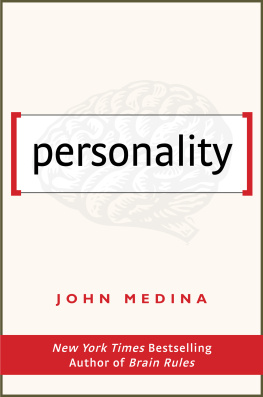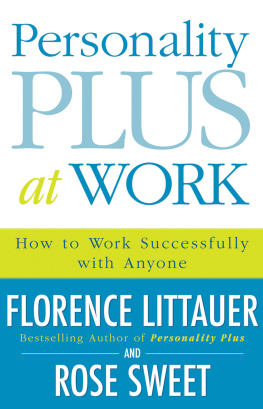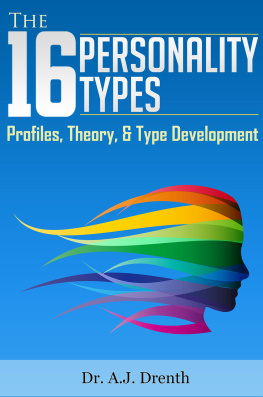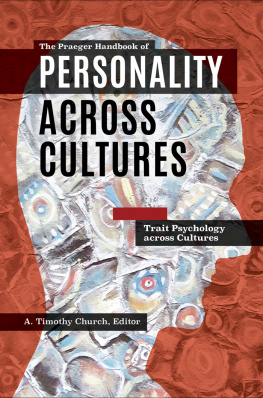About the Author
Helen Baron is a Chartered Psychologist who has spent her career researching and developing psychometric tests. An active member of the British Psychological Society, she was a founder member of its Standing Committee for the Promotion of Equal Opportunities and is currently a member of its Standing Committee on Test Standards. She lives in central London.
Why do employers measure personality?
Personality and work performance
Employers are looking for people who will work well in a job and have the skills and knowledge necessary to do their work to a high standard. Having the right skills doesnt always make the best employee, however. It is not only being able to do the job that is important, employers are also concerned about how the person approaches work and how well they fit into the organization. Some people approach work in a structured fashion, whereas others tend to develop better relationships with other members of staff, customers or suppliers. Some people like to do things in the same way all the time, and others like variety and will change the way they do things as often as they can. Depending on the job and the organization, these different approaches may be more or less suitable.
People have different levels of motivation for work and different things satisfy them. Some people work only for the pay and have little interest in the job itself. Obviously, some jobs are intrinsically more interesting than others, but some people are more likely than others to gain satisfaction from a task, no matter what it is. They gain satisfaction from a job well done, whether it is a happy customer, a problem solved, a project delivered on time or a clean floor. People can find motivation in interacting with others, working in a team, helping someone else, solving a problem, working out how something functions, wielding power and responsibility, being active and in many other ways.
Different jobs and organizations have a different potential to satisfy these personal needs. Jason, who likes achievements, might prefer a job with difficult goals and targets to reach. Jacinta might find constant striving for targets annoying or anxiety provoking. She might prefer a role where the pace of work was more measured and predictable, where she felt confident that she could accomplish everything that was needed and not have to worry about whether she could achieve what was required. Jason might find a job in sales with targets to achieve each month satisfying but an administrative job keeping records rather boring. Jacinta might find the administrative job appropriate and hate working in the sales environment. The way each person felt about a role would affect how they performed. All things being equal, it is likely that each person would work best in the role that best suited their personal style. It is, therefore, in both the employers and the job seekers interest to place people in jobs that suit their motivation and personality.
Working in a job that does not suit your personality generally requires more energy than one that is more in line with how you naturally behave. As an example of this consider Joanna and Josh, two tourist guides. Joanna, who is generally extroverted, likes talking to people and being the centre of attention, is happier in her work as a guide than Josh, who is naturally rather shy and is slow to develop a relationship when meeting new people. Josh has lots of interesting information to impart, but he can be perceived as a little cold and detached by those listening. He makes an effort to seem bright and entertaining to others and to amuse the group with jokes and humorous stories, and this does make his performance more successful. However, it is an effort for him, and at the end of the day he feels quite exhausted with putting on this act. When he is tired he finds it more difficult to maintain the faade and therefore becomes even less successful. Joanna, the more extrovert person, finds being bubbly and amusing quite natural and comes over to the group as warmer and more interested in them at least superficially. It costs her little effort to be lively in fact, she usually finds it energizing and ends the day on a high. The group enjoy Joannas more natural performance more than Joshs efforts. Thus the person whose behavioural style best suits the job performs better in the role and gets more satisfaction from doing it. This is a win win situation for the employer and employee. The person who is less suited to the role in terms of personality enjoys it less and produces a reduced level of performance, and this is a less good outcome for both the employer and the employee.
Personality style also affects the ease with which someone might learn the new behaviours required in a role. In sales or customer service roles staff need to learn how to interact with people, perhaps how to deal with a difficult customer, how to handle a complaint and how to close a sale. All of these require interacting with other people and influencing them to modify their behaviour or attitude become less aggressive, less angry or agree the purchase. There are techniques that are helpful in these situations, and with training anyone can become better at handling them. However, a person who is naturally comfortable interacting and influencing others is likely to find it easier to pick up such techniques and use them effectively than someone who is less outgoing or more task focused than people focused. The person with a personality that suits the requirements of the role is likely to take more away from training of this kind than the person who finds these behaviours more alien.
The examples so far are based on jobs that require interaction with people, and they contrasted people who are more extrovert with those who are more introvert. However, similar examples can be found that reflect other personality characteristics. For instance, some people are more rigid in their approach, preferring to do things according to the rules and to work in a consistent manner, whereas others are quite flexible, like to try different approaches, tend to ignore rules and do things as the feeling takes them. The former are better suited to roles where it is important to follow rules and structures where there are health and safety procedures that must be followed, for example. They are likely to learn procedures more easily and will naturally follow them once they know them. On the other hand, they will feel uncomfortable in less structured jobs where there are no set procedures and everyone finds their own way of doing things or where they are dealing with constant change. The more flexible people will feel comfortable in this type of role but are likely to feel constrained when they are working in a more rule-bound environment. They are more likely to break rules or skip some stages in a task, and this could lead to errors or even serious accidents. Studies have shown that people with some personality characteristics are more likely to have driving and work-related accidents. When health and safety officers investigate accidents they frequently find that lack of concern for procedures is in large measure to blame. Even where there are other contributing factors, such as faulty materials or equipment, the accident could often have been avoided had proper procedures been followed. For instance, a recent marine accident investigation found two crew members on a fishing boat were hurt when they fell over 4 metres from lifting gear, which they had used to get them out of the hold. Using the lifting gear was quicker and required less effort, but was much more risky than climbing the portable ladder that was the safe (and prescribed) way of exiting the hold. People who are adventurous and risk taking in their personality are much more likely to take this kind of dangerous short cut than those who are cautious and follow rules.












